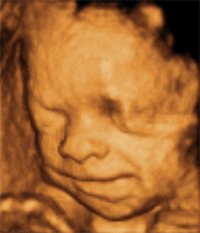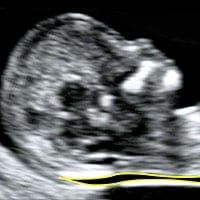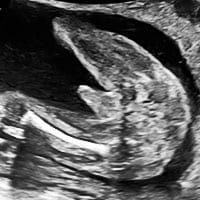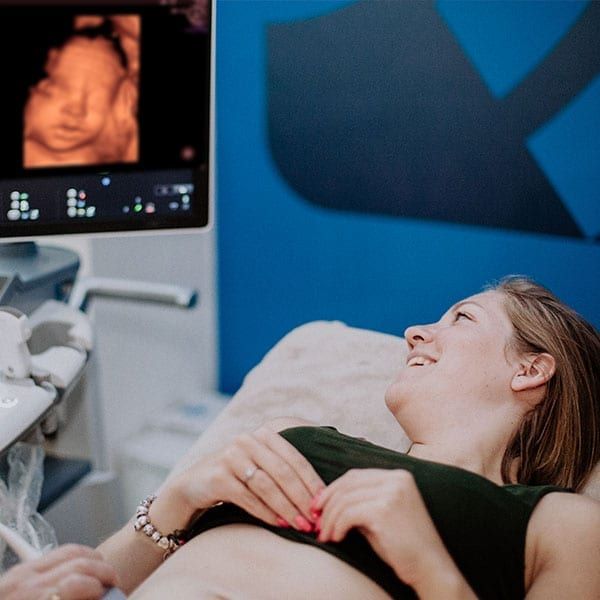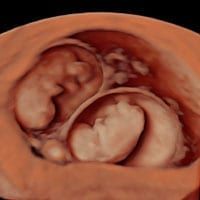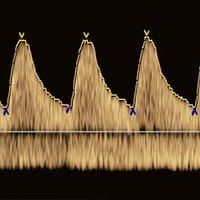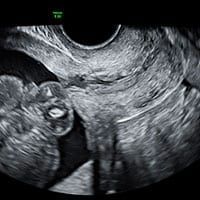Private Early Pregnancy Scans in London
We are experts in early anomaly detection, and comprehensive fetal screening at every stage of pregnancy. At LPC, we utilise the latest 2D, 3D and 4D imaging to screen for your baby’s health. Our team are experts in fetal echocardiography and neurosonography.

Viability Scan
The viability scan is the first scan in your pregnancy journey. It is sometimes referred to as the “dating scan” or “early pregnancy scan”.
Early Fetal Scan
The early fetal scan, which is our signature private pregnancy scan, aims to provide reassurance as early as possible, regarding the health and development of your baby.
Anomaly Scan
By 20-22 weeks of pregnancy, you are roughly halfway through your journey. This is an ideal time to re-examine the anatomical development of your baby using the anomaly scan/anatomy scan.
3rd Trimester Anomaly Scan
The NHS fetal screening program in the UK does not include any additional scans after the 18–20-week anomaly scan for pregnant women with no risk factors. This means that for most women, the 18–20-week scan is the last scan in their pregnancy. However, in many other countries, there are additional pregnancy ultrasound scan schedules for the third trimester, the scan findings aim to evaluate fetal growth and development.
Wellbeing Scan
Special 3rd trimester scan aiming to exclude late pregnancy problems and also check the baby’s growth and wellbeing. 4D scan included.
10 Weeks Scan
This is the earliest and most technologically advanced private ultrasound scan at 10 weeks which aims to exclude 10 major fetal anomalies visible at this stage. At 10 weeks of pregnancy, your baby’s main structures have already developed which allows us the chance to perform a first structural examination.
NIPT Test
We combine advanced NIPT for Downs syndrome and other chromosomal anomalies with our expert ultrasound anomaly scan to check baby’s health as early as possible.
Presentation Scan
The main aim of the presentation scan is to diagnose breech position or other abnormalities in the baby’s position. The clinician assisting you with the delivery will use this information to prepare for your baby’s birth!
Read more about our 1st trimester scans here.
Viability Scan/Dating Scan
The viability scan is the first scan in your pregnancy journey. It is sometimes referred to as the “dating scan” or “early pregnancy scan”.
If you are planning to have NIPT, the viability scan will help you to see how many babies you have and establish proper dating for your earliest NIPT appointment.
10 Week Scan
This is the earliest and most technologically advanced anomaly scan at 10 weeks which aims to exclude 10 severe fetal anomalies visible at this stage. 10 weeks of pregnancy is the best time to use 3D medical technology for your baby’s health check-up.
Undoubtedly this scan is the best ultrasound examination to have together with NIPT.
Early Fetal Scan
This is our signature scan. The early fetal pregnancy scans include thorough top-to-toe examination of the young baby to exclude anomalies as early as possible.
We are trying to exclude >100 serious anomalies, which are usually screened for by the NHS at 19-20 weeks.
Anomaly Scan
Our anomaly scan has a more comprehensive checklist of fetal structures than the 19–20-week NHS scan. We perform a thorough examination of the baby’s face, brain, heart, fingers, and other important organs. The best time for our anomaly scan is 22-23 weeks.
By request you can have uterine arteries dopplers and cervical length measurements at the same scan.
3rd Trimester Anomaly Scan
The NHS fetal screening program doesn’t offer any routine scans after the 18–20-week anomaly scan, meaning most women won’t have any additional baby checks before birth. This scan aims to screen for birth defects with late manifestation (especially for anomalies of the brain, heart and the kidneys). This period is the best for clinical use of 3D/4D.
Wellbeing Scan
We carefully check fetal wellbeing at this stage in order to confirm normal growth and development of the baby. This is more than just a growth scan: we check fetal growth and weight, perform fetal blood flow studies (dopplers) and look for placenta and amniotic fluid. We also perform the maximal possible checks for fetal anatomy and if possible, we perform 3D/4D.


Presentation Scan
The main aim of the presentation scan (or pre delivery scan) is to diagnose breech position or other abnormalities in the baby’s position. We also perform a thorough check-up of fetal growth and estimate the fetal weight. We assess fetal wellbeing by umbilical artery and middle cerebral artery dopplers.
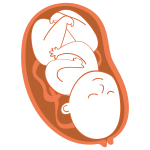

Scan upon request
Our fetal medicine consultants can offer a diagnostic second opinion and same day reassurance scan at any stage of your pregnancy. Contact us and our doctors will put in maximum effort to accommodate you as soon as possible.
Please note that we have NO facilities for urgent treatment and if you have serious abdominal cramps, pain or bleeding, leakage of fluid, absence of fetal movements or any other abnormal symptoms please go to hospital.


Early Baby Heart Scan
Our Early Fetal Echocardiography is our special scan to confirm the normal development of the baby’s heart. From 12 weeks we can exclude up to 80% of prenatally detectable severe fetal heart defects.
This scan is highly recommended if your baby has an increased nuchal translucency (NT), or other unusual findings or anomalies on your 1st trimester scan.
Other Scans you may have seen elsewhere…
At London Pregnancy Clinic, we believe that every scan should be as meticulous as possible. With every scan, our doctor will endeavour to check every aspect of your baby’s development to produce a comprehensive diagnosis. That is why we don’t offer the scans below as standalone scans; these examinations are organically included (for free) into our other scans. If there is clinical indication, our doctor will recommend you have additional examinations during your mainstream scan.
Furthermore, while we extensively use 3D/4D imaging for our medical scanning, the scan is performed for medical purposes, not just to get nice images of your baby. Please note that in some cases it is also impossible to get good quality baby’s pictures due to its position or other technical reasons.
On your request we can reveal the baby’s gender at any scan from 13 weeks.
You have a question? We have an answer.
Currently, NHS Fetal Anomaly Screening Programme includes screening for…
- Down’s syndrome is offered to all eligible pregnant women and takes place between 10⁺⁰ and 20⁺⁰ weeks of pregnancy.
- Edward’s syndrome and Patau’s syndrome are offered to all eligible pregnant women and take place between 10⁺⁰ and 14⁺¹ weeks of pregnancy.
- 11 physical conditions as part of the 20-week scan are offered to all pregnant women and take place between 18⁺⁰ and 20⁺⁶ weeks of pregnancy. Scans can be completed up to 23⁺⁰ weeks of pregnancy.
Your first scan with the NHS is likely to be the nuchal translucency/dating scan at 11-13 weeks. This scan is predominantly designed to screen for the same chromosomal anomalies (Down’s, Edward’s and Patau’s syndromes) as NIPT using an older methodology developed in the 1990s. NIPT is a far more advanced test developed in 2011 with a much higher accuracy.
Most crucially, majority of NHS Trusts have no protocols for structural anomalies screening at 11-13 weeks. Our scans are especially designed to screen for every anomaly detectable from an early gestational age and will improve the management of the pregnancy.
The second scan by the NHS is usually done at 19-20 weeks, this is called an anomaly scan and includes screening for 11 conditions:
- Edwards’ syndrome (T18)
- Patau’s syndrome (T13)
- anencephaly
- spina bifida
- cleft lip
- congenital diaphragmatic hernia
- gastroschisis
- exomphalos
- congenital heart disease
- bilateral renal agenesis
- lethal skeletal dysplasia
At London Pregnancy Clinic, we screen for these 11 conditions among other 100 anomalies at the 12-16 week early fetal scan, however we are well aware that in some cases those abnormalities can have delayed manifestation (for example diaphragmatic hernia) or being too small to be detected (cleft lip).
Yes, of course. We use Tricefy which is a secure cloud system to upload images from your scan to be viewed before you even leave the scanning room! You will also receive a hard and soft copy of your detailed ultrasound report as well as some high-quality colour printouts for you to take home with you!
Tricefy also allows you to download the images from the scan to share with your loved ones via message/social media.
We provide still ultrasound images for you to take away with you on the day. We also send these to you electronically, with a couple of video clips. We’ll provide a USB stick with the full 3D/4D experience.
You can have as many scans as needed for appropriate management of your pregnancy. Some mothers with complicated pregnancies, in order to confirm fetal wellbeing, can have scans a few times a week. There are no cumulative effects from repeated scans.
Ultrasound is very safe for your baby because it uses low intensity sound and there isn’t any radiation exposure. The results of the WHO systematic review on safety of ultrasonography in pregnancy has showed that ultrasonography in pregnancy was not associated with adverse maternal or perinatal outcome, impaired physical or neurological development, increased risk for malignancy in childhood, subnormal intellectual performance or mental diseases.
The only known effect from the use of ultrasound equipment is its potential to increase temperature of the body. It can happen only with prolonged (more than hour) uninterrupted scanning with high intensity ultrasound modes and with use of outdated equipment.
During every private pregnancy scan in London, we control thermal index (TI) as an on-screen guide of the potential for tissue heating and strictly following ALARA principle (as low as reasonably achievable) during all scans. For early pregnancy scans we perform an ongoing audit of thermal index (TI) and time of the scan.
We think that the best scan schedule for uncomplicated pregnancy is:
- Viability scan at 7 weeks
- 10 Weeks Scan and NIPT at 10 weeks
- Early Fetal Scan at 16 weeks
- Anomaly Scan at 22 weeks
- 3rd Trimester Anomaly Scan at 28 weeks
- Wellbeing scan at 32 weeks
- Presentation scan at 36 weeks
We think that essential scans for every future mother for uncomplicated pregnancy are:
- 10 Weeks Scan and NIPT (affordable Invitae NIPS) at 10 weeks in London Pregnancy Clinic
- NHS NT scan preferable at 13 weeks
- NHS anomaly scan at 19-20 weeks
- 3rd Trimester Anomaly Scan at 28 weeks in London Pregnancy Clinic
This minimalistic schedule will give you:
- earliest scan to exclude major anomalies (10 weeks Scan)
- best option for Down’s syndrome screening (Invitae NIPS)
- screening for anomalies with late manifestation and early fetal growth disorders which can be invisible at 19-20 week at NHS anomaly scan (3rd trimester anomaly scan)
Early fetal echocardiography is the most advanced and comprehensive ultrasound scan in early pregnancy.
We will perform:
- Special examination for fetal heart
- Top-to-toe examination of all baby’s organs and structures
You can have also NIPT for the most accurate Down’s syndrome screening as add-on option during this scan
We perform all the spectrum of expert scans in pregnancy
Please contact us if you have any requirements for specific ultrasound scan or test

